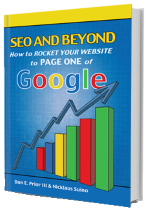Five SEO Tips You Can't Live Without
First, find the best keywords!
There are two things that the average business website does that are NOT very helpful to SEO. First, they choose words that only a person who already knows about their business would type into Google. For example, a local heating a cooling business we know optimized their site for the word “mechanical.” Now, an educated person might know that “XYZ Mechanical” would repair and install home furnaces, but someone whose furnace just quit will probably type in “furnace repair.” You have to make that kind of calculation for all your keywords.
Second, they choose keywords that very few people are searching for. If you have limited space on your site (and you SHOULD limit the number of words on your homepage, at least), then you want to focus on the keywords that most people are searching for. There are a number of good tools to find out, including the keyword tool on Google Adwords, and many free services offered by the search engines. Make sure the keywords you select are actually ones being commonly searched in your area of specialty.
Second, check your successful competitors!
Find out how many incoming links your competitors have, and their top five keywords. This will give you very specific guidance as to (1) how many links you’ll need to compete, and (2) what keywords they deemed important.
You’ll have to dig a little deeper to make this information meaning, however. The quality of incoming links is at least as important as the number, so you can use of the many free back link checkers to find out the Page Rank of your competitor’s incoming links.
You’ll also want to go further with your analysis of your competitor’s keywords. Review them just as you do your own – make sure they’re keywords that are widely searched, and figure out how to incorporate them into key phrases that generate sustained search interest.
Third, add great content!
This is the thing Google is trying to get you to do, anyway. You want to include actual content that inspires people to visit your site and share it with others. If you aren’t a great writer, find someone who is. In the large context of your advertising budget, freelance web writers are often very affordable. Here are some of the qualities of good online content: originality, usefulness, worth sharing, accuracy, detail, excitement. One way to learn more about shareable content is to visit one of the free sites that allows you to search for most shared articles. Study those articles and you’ll figure out some of the things they do that make them so shareable.
Fourth, make sure you optimize your page titles and meta description.
Page titles are those words that appear at the top of your browser window, usually in the gray or blue space above the URL (uniform resource locator). Make sure your page titles contain as many of your top keywords as possible while still reasonably indicating the purpose of the page. There’s a lot of evidence to suggest that Google only considers the first 66 characters of a page title, but many SEO experts still advise including as many words as you think are necessary to adequately describe the page.
The meta description is a phrase or list of keywords that aren’t seen by the human viewers of your site, but are read by the search engines. It’s sort of a “second chance” to point out what your page or site is all about. As part of what we call “four-in-one” keyword optimization, we like to be sure our most important keywords are included in the page title, meta description, headers, and text of our home page.
Fifth, be sure to use title and ALT attribute
The title attribute is included in the html of a link. Though the viewer won’t see it (unless she’s looking .. or actually, if he or she is blind. Browsers for the visually impaired often read the title and ALT attributes) it tells the search engines more about where they will end up if they click the link. Since this isn’t meant to be a technical article, we’ll just say here that the link will not only contain the URL of the destination page, but also a short description of it. Once again, this is a good place to employ keywords.
The ALT attribute is also for the search engines and those who use browsers or readers for the visually impaired. It gives more information about an image, which otherwise wouldn’t have any value to the search engine.
This is far from an exhaustive list of SEO methods. But it will help get you started. If you’re not inclined to do this kind of work for yourself, or if you’re too busy, give us a call at 877-815-6974.
We’ll do a quick FREE evaluation of your website, and let you know if we can help get you to page one of Google!







